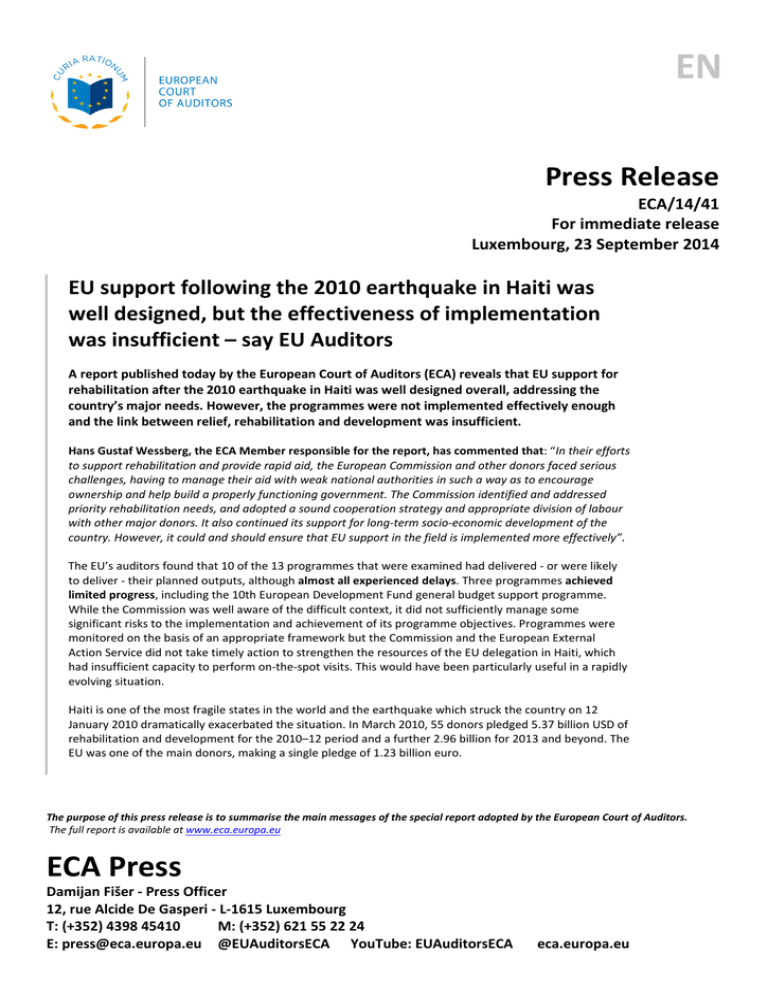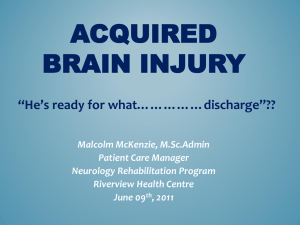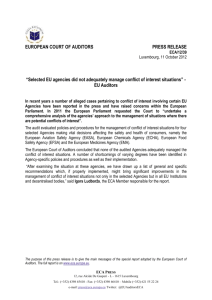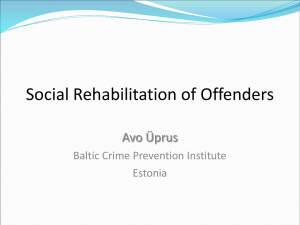Press Release Haiti - European Court of Auditors
advertisement

EN Press Release ECA/14/41 For immediate release Luxembourg, 23 September 2014 EU support following the 2010 earthquake in Haiti was well designed, but the effectiveness of implementation was insufficient – say EU Auditors A report published today by the European Court of Auditors (ECA) reveals that EU support for rehabilitation after the 2010 earthquake in Haiti was well designed overall, addressing the country’s major needs. However, the programmes were not implemented effectively enough and the link between relief, rehabilitation and development was insufficient. Hans Gustaf Wessberg, the ECA Member responsible for the report, has commented that: “In their efforts to support rehabilitation and provide rapid aid, the European Commission and other donors faced serious challenges, having to manage their aid with weak national authorities in such a way as to encourage ownership and help build a properly functioning government. The Commission identified and addressed priority rehabilitation needs, and adopted a sound cooperation strategy and appropriate division of labour with other major donors. It also continued its support for long-term socio-economic development of the country. However, it could and should ensure that EU support in the field is implemented more effectively”. The EU’s auditors found that 10 of the 13 programmes that were examined had delivered - or were likely to deliver - their planned outputs, although almost all experienced delays. Three programmes achieved limited progress, including the 10th European Development Fund general budget support programme. While the Commission was well aware of the difficult context, it did not sufficiently manage some significant risks to the implementation and achievement of its programme objectives. Programmes were monitored on the basis of an appropriate framework but the Commission and the European External Action Service did not take timely action to strengthen the resources of the EU delegation in Haiti, which had insufficient capacity to perform on-the-spot visits. This would have been particularly useful in a rapidly evolving situation. Haiti is one of the most fragile states in the world and the earthquake which struck the country on 12 January 2010 dramatically exacerbated the situation. In March 2010, 55 donors pledged 5.37 billion USD of rehabilitation and development for the 2010–12 period and a further 2.96 billion for 2013 and beyond. The EU was one of the main donors, making a single pledge of 1.23 billion euro. The purpose of this press release is to summarise the main messages of the special report adopted by the European Court of Auditors. The full report is available at www.eca.europa.eu ECA Press Damijan Fišer - Press Officer 12, rue Alcide De Gasperi - L-1615 Luxembourg T: (+352) 4398 45410 M: (+352) 621 55 22 24 E: press@eca.europa.eu @EUAuditorsECA YouTube: EUAuditorsECA eca.europa.eu EN Notes to editors: European Court of Auditors (ECA) special reports are published throughout the year, presenting the findings of selected audits of specific EU budgetary areas or management topics. This special report (No 13/2014) entitled “EU support for rehabilitation following the earthquake in Haiti” examines whether EU support for rehabilitation of the country was well designed and implemented, and whether the Commission properly linked the provision of relief with rehabilitation efforts and development aid. At a time when Haiti was still recovering from the 2008 storms, an earthquake measuring 7.0 on the Richter scale struck the capital and the surrounding area on 12 January 2010, claiming a heavy toll in human lives and causing massive destruction. Around 230 000 people were killed and 300 000 injured, approximately 1.3 million people were made homeless in Port-au-Prince and over 500 000 people left the disaster area to seek refuge in the rest of the country. Poor sanitary conditions, which worsened dramatically after the earthquake, facilitated the outbreak of a cholera epidemic. The main rehabilitation needs concerned housing and urban rehabilitation, water, sanitation and hygiene, health, food security and education. Despite massive financial aid and a major international relief effort, an estimated 210 000 people were still living in tented camps at the end of 2013. The EU’s auditors found that despite some Commission efforts, relief, rehabilitation and development were not sufficiently linked. The Commission used a range of complementary instruments flexibly and designed individual rehabilitation programmes to ensure the linkage between relief, rehabilitation and development. However, ECHO and EuropeAid had no clear common country strategy to optimise the synergies and smooth transition between their respective activities. The weak national administration and insufficient government commitment to reform were significant challenges to effective rehabilitation and the creation of conditions for sustainable development. The EU’s auditors make the following recommendations to improve the effectiveness of Commission operations in the context of a post-disaster or fragile situation: • the Commission should, at the outset of programmes and, where appropriate, during implementation, assess the likelihood and potential impact of the main risks to the achievement of programme objectives and take measures to prevent or mitigate these risks; • EuropeAid and ECHO should adopt a common strategy on linking relief, rehabilitation and development to ensure effective synergy between their respective activities; • when providing budget support, the Commission should, in coordination with other donors: a) provide adequate capacity-building support and focus on key PFM functions, including accountability and anti-corruption mechanisms; b) support the timely preparation of an appropriate PFM reform programme; c) • where appropriate, set out shorter-term measures for safeguarding EU funds against waste, leakage and inefficiency; in cases involving natural disasters or other similar events, and particularly those affecting the functioning of the EU delegation, the Commission and the EEAS should develop business continuity procedures, including provisions for emergency personnel redeployment. 2








